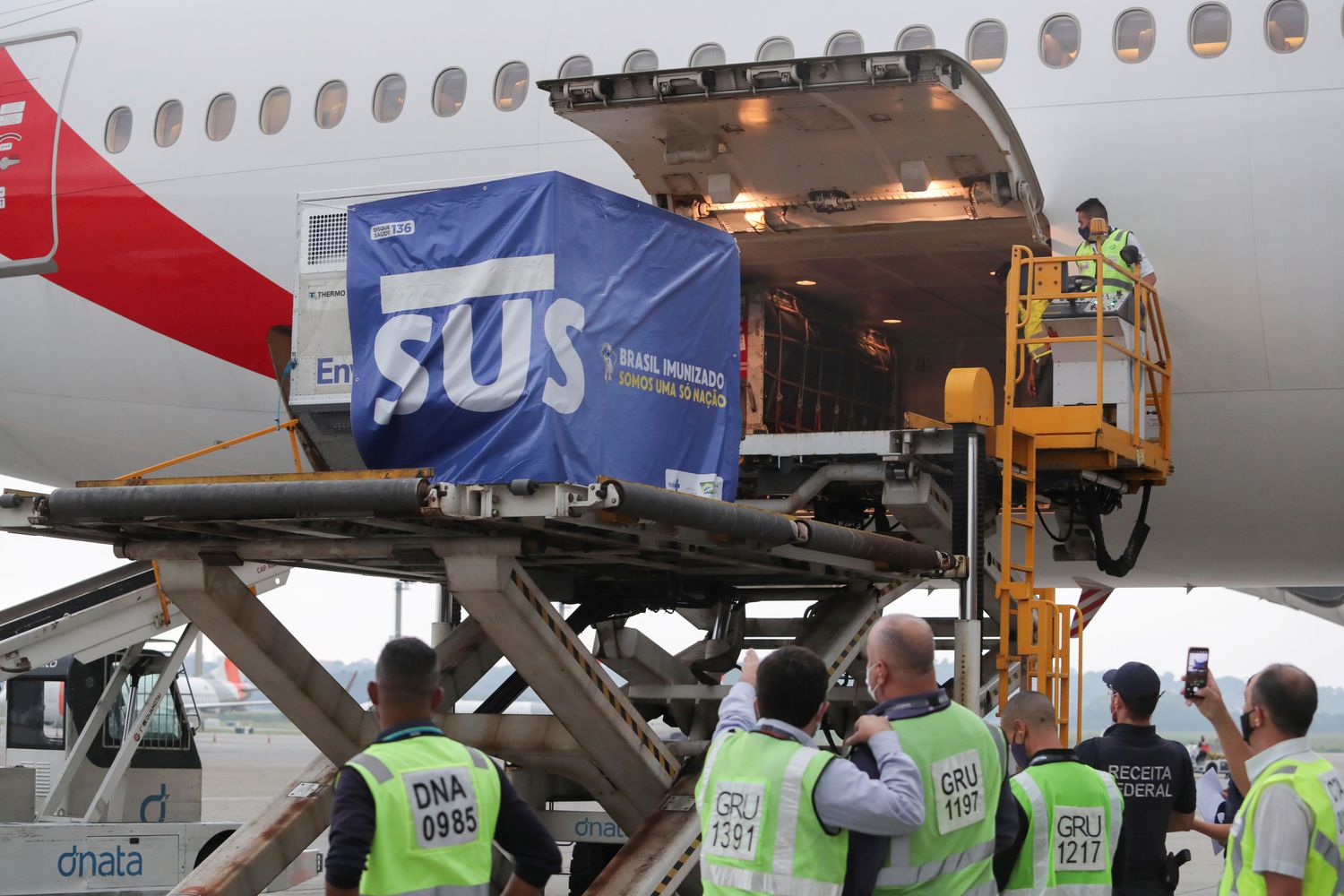RIO DE JANEIRO, BRAZIL – With the arrival of two million doses of AstraZeneca’s Covid-19 vaccine manufactured in India, and the emergency use authorization of another 4.8 million doses of the Coronavac by ANVISA (National Health Regulatory Agency), Brazil has doubled the amount of available vaccines and boosted this first stage of the immunization campaign. There are 12.8 million doses already authorized for use by the health regulator, including those distributed among states this week.

Administered in two doses as determined by the manufacturer, the available immunizers will only be sufficient to immunize a little over six million people – or about 3% of the entire population. In the context of a global race for the drugs, the country is still unclear on its vaccination schedule, given the obstacles it faces to import the raw material required to produce more doses in Brazil.
Oxford/AstraZeneca’s vaccines arrived in São Paulo late Friday afternoon, January 22nd, and were to be shipped to the Fiocruz facilities in Rio de Janeiro overnight. On Saturday, they will be labeled (with information in Portuguese) by Fiocruz for distribution to the states. The logistics operation should start late Saturday afternoon.
Just before the arrival of immunizers, ANVISA unanimously approved the emergency use of doses produced by Sinovac Chinese laboratory, imported in bulk to be packaged and labelled by the Butantan Institute. Last week, approval had been granted only for pre-packaged doses imported from China.
Henceforth, both the imported ready vaccines and those packaged by Butantan (both already analyzed by the agency) may be administered. A new review will be required only if Butantan begins to produce other batches of the vaccine in Brazil or if there are changes in the Chinese manufacturing chain.
ANVISA recommends two dose administration
The ANVISA official also advised that each user should be given two doses of the immunizer, as stated in the manufacturer’s package insert, and argued that the best scenario is to extend access to a greater number of vaccines. “In the vaccination context in Brazil, no one can be left out. We are one nation”, she stated, repeating the federal administration’s slogan for immunization. There is debate in Brazil and in other nations about vaccinating more people early with the available doses, and spacing the interval before the second dose, but there is no scientific support for this procedure.
“Following this is crucial to ensure adequate vaccination,” agrees ANVISA’s general manager of drugs and biological products, Gustavo Mendes Lima Santos. The second dose of AstraZeneca’s vaccine should be administered in a four-to-twelve week interval while the Coronavac should observe a period of up to 21 days after the first administration.
This is an important issue in Brazil, as managers need to reserve the second dose for those now being vaccinated, to ensure the efficacy reported in drug trials. The Ministry of Health itself emphasized this aspect this week, as some municipalities planned to use all the doses received at a time when there is no frequency and forecast for new deliveries.
This led governors to assign 5% of the new Coronavac batch and the first AstraZeneca batch to Amazonas, given the tragic situation the state is experiencing with the high number of cases and deaths by Covid-19. The collapse of the Amazonas healthcare system, marked by oxygen shortages, has already spread inland. The other doses should be apportioned to states according to population size, as occurred with the first shipment.
ANVISA’s board of directors also stressed the emergency natuare of the authorization of vaccines, given the lack of therapeutic alternatives to Covid-19 and the severity of the pandemic in the country, emphasizing the importance of keeping track of users being immunized.
ANVISA’s president Antônio Barra Torres said that the vaccines are experimental and that the “current method is based on volunteering”, advising a consent form. After the ANVISA meeting, Mendes clarified during a press conference that the consent form had already been approved on Sunday, but its implementation falls under the National Immunization Plan (PNI).
“ANVISA will not enforce it. It has established it to be in line with the practice of other countries, but the implementation must be in line with the PNI,” he said.
Brazil is still facing challenges to import the raw materials required for the production of immunizers by the Butantan Institute and by Fiocruz (which will produce the AstraZeneca vaccine); this may delay the schedule for delivery of doses by both institutions in coming months. Although contracts have been signed, the exportation of the active ingredient has not yet been approved by the Chinese authorities.
In a letter to the Federal Prosecutor’s Office, Fiocruz has already accepted that it would not be able to deliver the doses scheduled for February to the Ministry of Health. Due to the obstacles that may lead to a disruption in the vaccination campaign begun this week, the federal government is seeking to negotiate the purchase of further pre-packaged doses, and some states are also trying to increase purchases.
Source: El Pais

